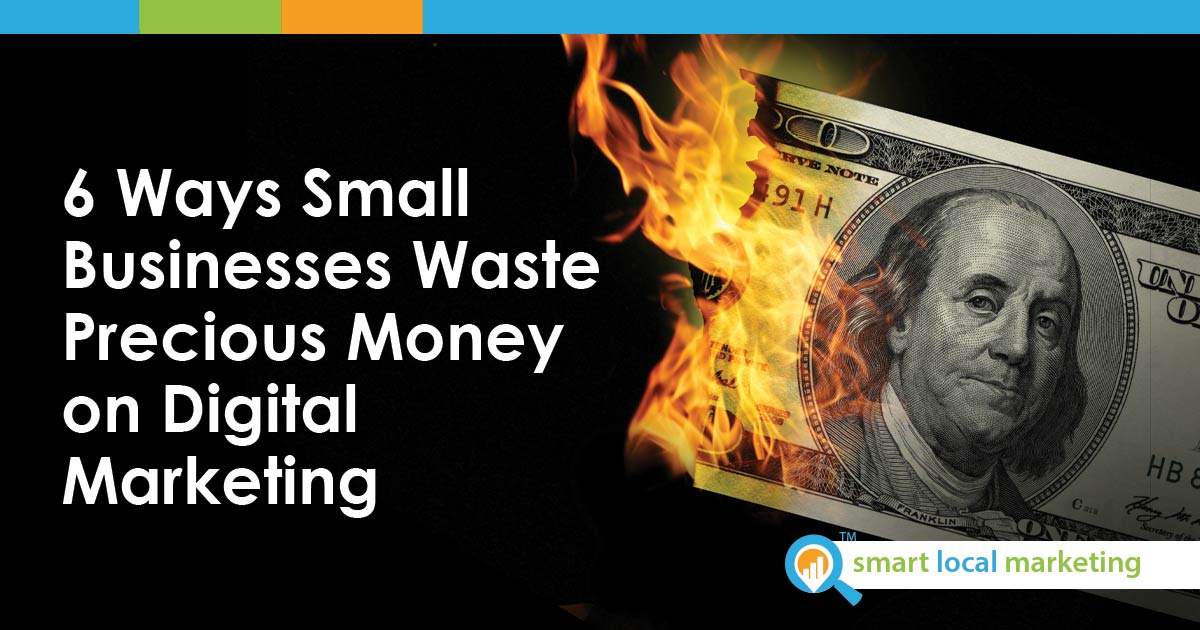
Digital marketing has given small businesses the edge in distinguishing themselves in local markets. It’s easier than ever for any business owner to boot up the internet, grab a credit card and start marketing across a variety of channels—Google Ads, social media ads, SEO campaigns and more. From restaurants to thrift shops, hardware stores to landscaping outfits, small businesses are getting the word out and attracting new businesses!
Accessibility doesn’t equate to proficiency, however. Just because it’s easy to spend money and generate views and clicks doesn’t mean you’re necessarily spending your precious marketing dollars wisely. In fact, many businesses quickly find that they’re spending more than they want to and seeing less than they expected. Don’t worry—it’s a simple problem to fix if you know what to look for.
Here’s a look at six of the most common ways small businesses waste money on digital marketing—and how to spend those dollars more effectively.
1. Too Much Focus on Branding
If you follow any of the big-name digital marketing gurus out there, you know they all harp on branding. Brand, brand, brand! And while this is great advice for creating a following, it takes time. While big businesses can throw thousands at creative pursuits and build a brand overnight, small businesses are better off building a brand through sweat equity and spending those dollars more effectively.
Don’t try to build a brand at the expense of sales! Instead, put your marketing dollars into a medium designed to generate sales. This isn’t to say you should abandon any attempt to build a brand—instead, scale them back to more meaningful efforts. For example, instead of spending money on an expensive ad placement on a prestigious website, funnel that money into PPC ads. Then, exceed customer expectations with your product or service. They’ll remember your brand based on the experience—not the expensive marketing.
At the end of the day, people want products and services that solve a problem. If you can do this and create an above-average experience, people will love your brand regardless of how popular or polished it is. This is especially important for local small businesses. Aim to be the hometown hero with great products and services, not the larger-than-life brand that’s too big for its market.
2. Overreliance on One Medium
Too many small business owners dive into the world of digital marketing and get stuck in one medium. The fact is, there’s a whole world of digital marketing opportunities out there. Pigeonholing yourself to one medium like PPC ads or Instagram ads only limits your audience—and it’ll eventually increase your total ad spend.
Marketing across multiple digital channels gives you access to different opportunities at different times. Google ads have a sense of urgency—people search and click immediately, and the ad needs to give them what they’re looking for immediately. Facebook ads, on the other hand, are more passive. You can run them often to create exposure and learn more about your audience from the demographic data Facebook provides. There’s also Instagram ads, PPC ads, email marketing and more—all of which give you more opportunities to address more people. Leveraging multiple channels casts a wider net and delivers a unified message to those who see your ads.
Don’t go too overboard, though! If you stretch your ad budget too thin across multiple mediums, you won’t get traction through any of them. Pick 2-3 digital channels appropriate to your business, your message and your audience. Watch your spend on each and continue to improve your strategy to maximize digital ad spend across channels.
3. Not Developing Metrics or KPIs
There are two parts to digital marketing: creating your message, then tracking your results. Too many small businesses forget about the second part! How do you know if your marketing is effective if you don’t have metrics for tracking it?
There are many different levels for developing digital marketing KPIs. Small businesses should start with the simplest ones, to get in the habit of tracking marketing efficiency and ROI:
- Cost per click (CPC): The cost you pay per ad click (lead).
- Conversion rate (CR): The number of clicks that end in a purchase (conversion).
- Customer lifetime value (CLV): The total spend of each conversion (ROI).
Basic benchmarks will give you an idea of how well your digital marketing investments are paying off. For example, if you have a super-low conversion rate on one campaign and a super-high conversion rate on another, you can use that information in creating future marketing materials.
Remember, the world of digital marketing metrics can be as complex and insightful as you need or want it to be. Here’s a look at some of the other important metrics small businesses should eventually start tracking across multiple channels:
- Click-thru rate (CTR)
- Cost of customer acquisition (COCA)
- Web traffic to lead ratio
- Social engagement metrics
- On-page conversions
Don’t track metrics for the sake of tracking metric, either. Understand the meaning behind these numbers and how they affect your marketing messages, tactics and techniques.
4. Not Shopping Around
Most small businesses outsource their digital marketing to experts like BizIQ. Why not pay someone who knows what they’re doing? It’s a smart move and a great investment for many local small businesses. You need to make sure you’re getting the best value for your money.
There are tons of digital agencies out there and a wide variety of prices to boot. Don’t only look at prices—be aware of what you’re getting for your money. For example, it’s not uncommon to pay $500-$750 per month for PPC ads. The difference is that some companies eat this fee in administrative costs while others like BizIQ actually put that money to work across multiple digital channels. When discussing digital marketing fees, ask what you’re getting for your money and make sure it includes things like marketing spend across multiple channels and consistent oversight for your business’ online presence.
Don’t get suckered into the “pay more, get more” trap. Look for value and make sure the professionals you’re working with understand your business and your marketing priorities. Make sure they’re tracking benchmarks and don’t be afraid to ask about marketing efforts. Most importantly, if you’re not seeing results proportionate to your spend, ask why.
5. Not Targeting Customers Specifically
One of the reasons digital marketing is so powerful is because of its customization and personalization. Small businesses have the ability to market from very broad criteria, all the way down to niche, specific audiences. As general as “women in Marietta, GA” to as specific as “single women in Marietta, GA over 50, who make more than $80k each year and who own a dog.” The trick to mastering digital marketing and maximizing the efficiency of your marketing dollars is to target customers with a high level of accuracy.
Sometimes, a broad net is the best one to cast. Other times, you can spend less and target more specifically. It’s all about the type of digital campaign you’re running. Experiment with different levels of targeting and measure clicks and conversions to see how effective you are at getting people’s interest. You’re likely to find that you pay less for broad marketing and see lower results, and pay more for specific targeting to see better results. The trick is balancing spend and effectiveness to market efficiently.
To succeed in targeted marketing, make sure the message speaks directly to the audience. The better you know your customers, the more specifically you can speak to them. When it feels like you’re talking to someone you know personally, the marketing message will have more meaning behind it.
6. Spending Just to Spend
The biggest mistake many small businesses make when they dive into digital marketing is spending just to spend. Digital marketing isn’t a silver bullet, and spending money on ads won’t automatically create conversions. It takes work to get it right. Spend time getting familiar with the platforms you’re using and take the time to run tests or try different things, to get a feel for what you’re doing. Set your expectations.
Like anything, digital marketing takes a mix of time and effort to yield results. Thankfully, there are no shortage of articles, blog posts, YouTube videos, webinars, tutorials and other learning materials that make it easy to get started with small business digital marketing. And, of course, you can always enlist the help of a professional who understands the ins and outs of digital platforms.
The biggest takeaway is to take it slow. You’re not going to flip the switch and start reeling in customers overnight. Start slow, spend wisely and get comfortable with learning. Over time, the leads will start to trickle in and you’ll start to see conversions. Avoid dumping in thousands of dollars and setting your marketing on autopilot—it’s one of the easiest ways to waste money. Instead, look for opportunities in digital marketing and don’t be afraid to pursue them.
Every Dollar Counts. Spend Them Wisely!
Local small businesses don’t have thousands to throw at brand initiatives. They don’t have a full marketing department to rely on, to track KPIs and optimize PPC campaigns. Every dollar counts and every opportunity is important. Use these tips to save money and maximize your efforts, and put yourself on the track to digital marketing dominance!
If it’s all just too much to manage for one person, remember that BizIQ has your back. Contact us today and learn more about what we can do to help you save money and optimize your online marketing.









